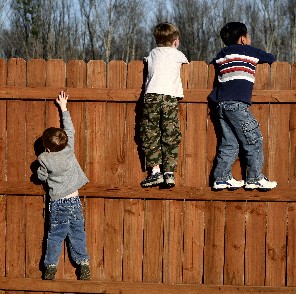 In many cases siblings will develop at different rates. The second — or third or fourth — child may develop faster or slower than the older sibling. This goes for all types of maturation – physical, mental, and social. There are two siblings, ages nine & 11, on my football team. The nine-year-old is taller, faster, and decidedly more athletic than the 11-year-old. I know two cousins, six months apart in age, who are about 4 years apart in social skills. Fruit from the same tree can ripen at different times.
In many cases siblings will develop at different rates. The second — or third or fourth — child may develop faster or slower than the older sibling. This goes for all types of maturation – physical, mental, and social. There are two siblings, ages nine & 11, on my football team. The nine-year-old is taller, faster, and decidedly more athletic than the 11-year-old. I know two cousins, six months apart in age, who are about 4 years apart in social skills. Fruit from the same tree can ripen at different times.
Although we generally try to go with the positive “DOs” here at Your Parenting Info, this week we present some helpful DON’TS for dealing with the Maturity Gap.
1) Don’t Ignore It
You can’t pretend that the Maturity Gap doesn’t exist. There is no one size fits all box that covers every child’s developmental schedule. Don’t pretend that little Jimmy is just as advanced as big Joey was at his age. Forcing Jimmy into Joey’s box is a sure way to cause self-esteem issues for one or the other. Recognize each child for who he is and work with him at his level.
2) Don’t Compare
Little Suzy never needs to hear that big Sally was faster or better at reading or able to swim at her age. Likewise, a big sister doesn’t need to hear that the little one is outpacing her, unless it comes with compliments for big Sally and her mentorship of her little sister.
For example, our sons are 5 years apart. Young Lex cannot beat his big brother, Max, at anything physical. But he is better at sports at age 6 than Max was at that age. Sometimes it is good to console the younger by pointing out that he’s ahead of big brother’s pace. But we always make sure to give some credit to Max for teaching, pushing, and inspiring his little brother.
3) Don’t Let It Define Them
While rule #1 still applies, you shouldn’t go too far the other way, either. You need to recognize that Billy isn’t as strong a reader as Bobby was at his age, but it would be a grave mistake to just unilaterally lower your expectations for Billy and let him wallow in mediocrity because reading “isn’t his thing”.










